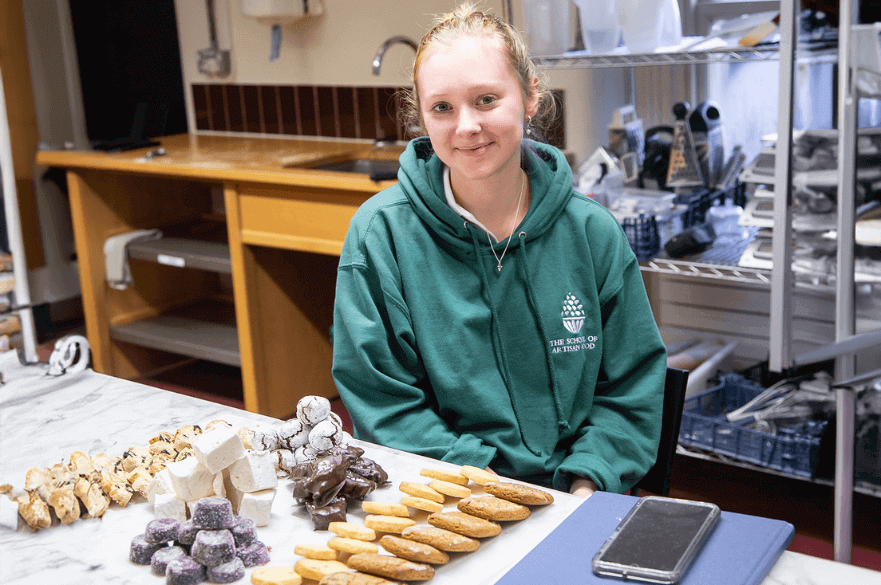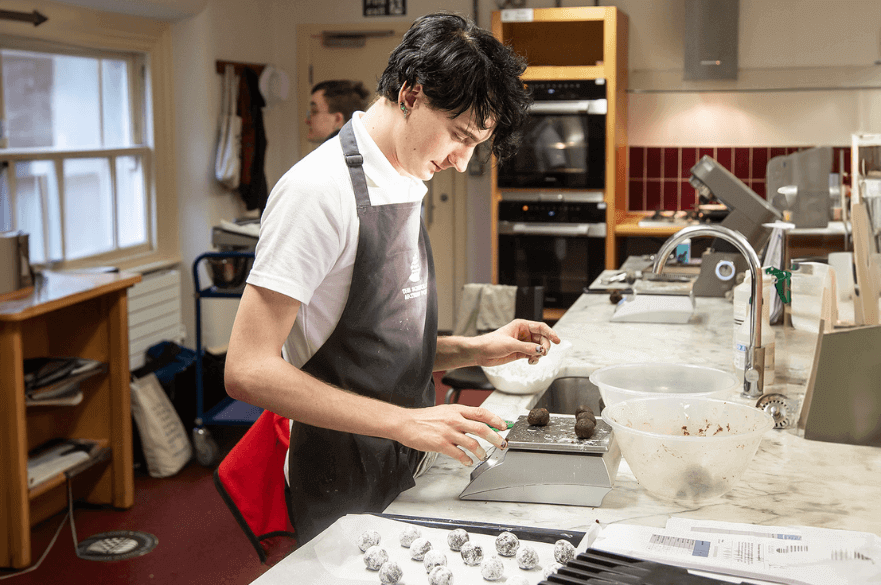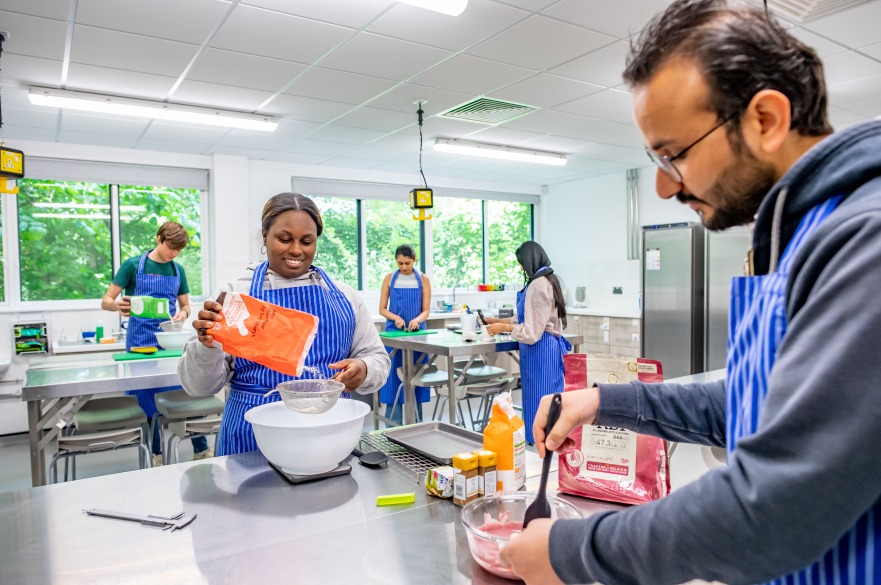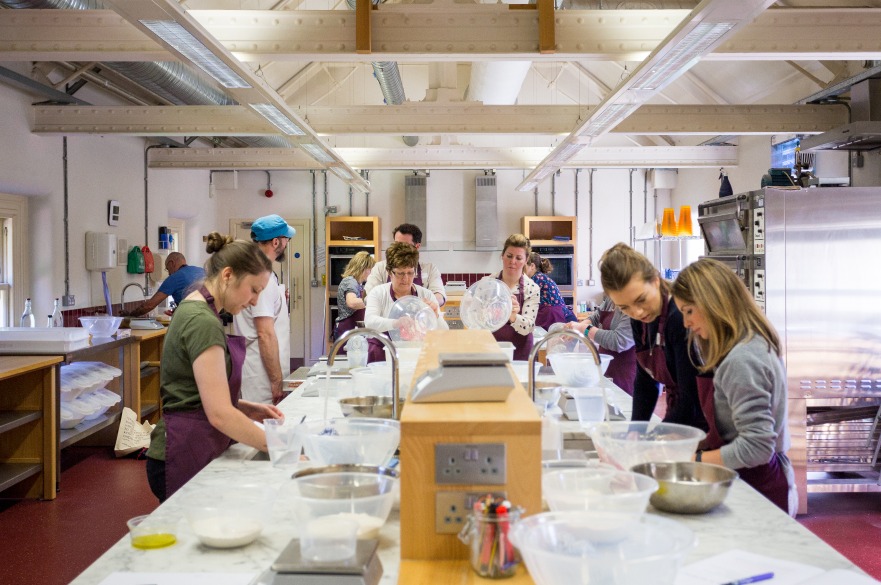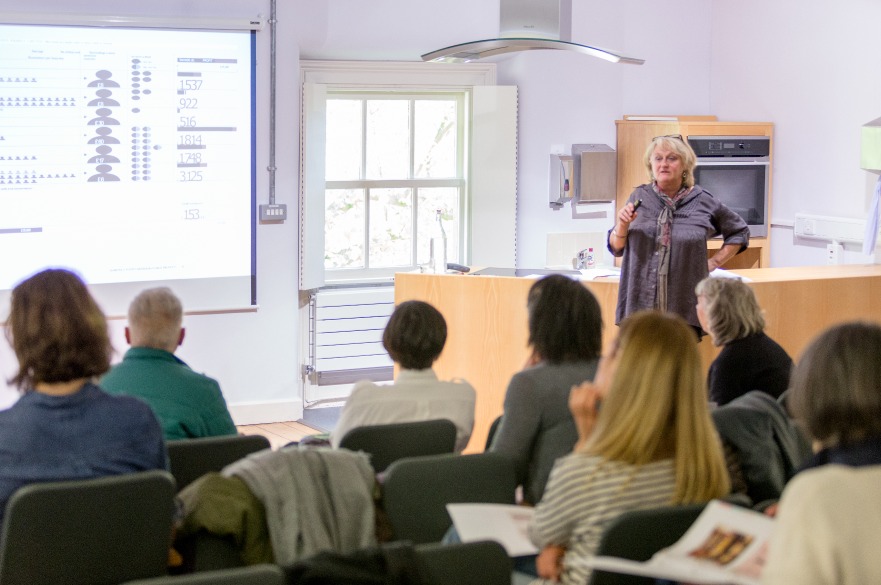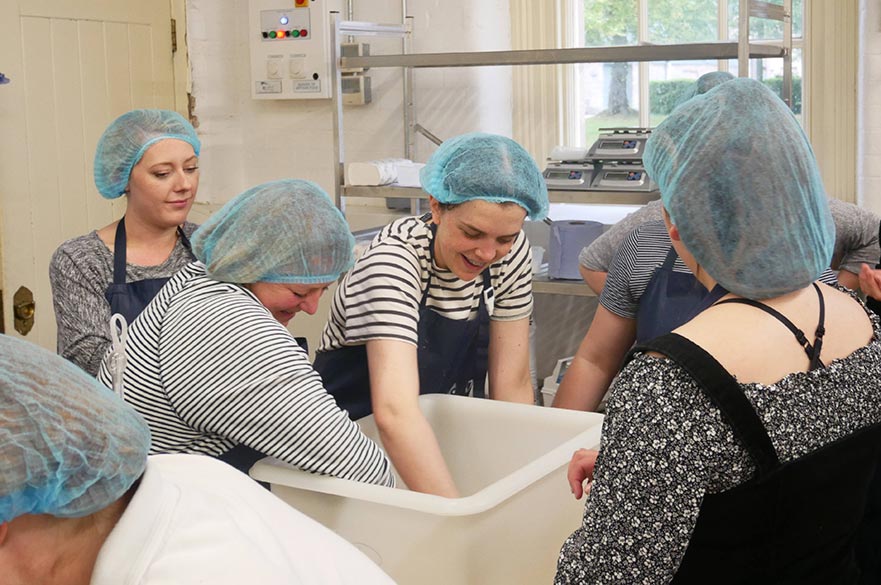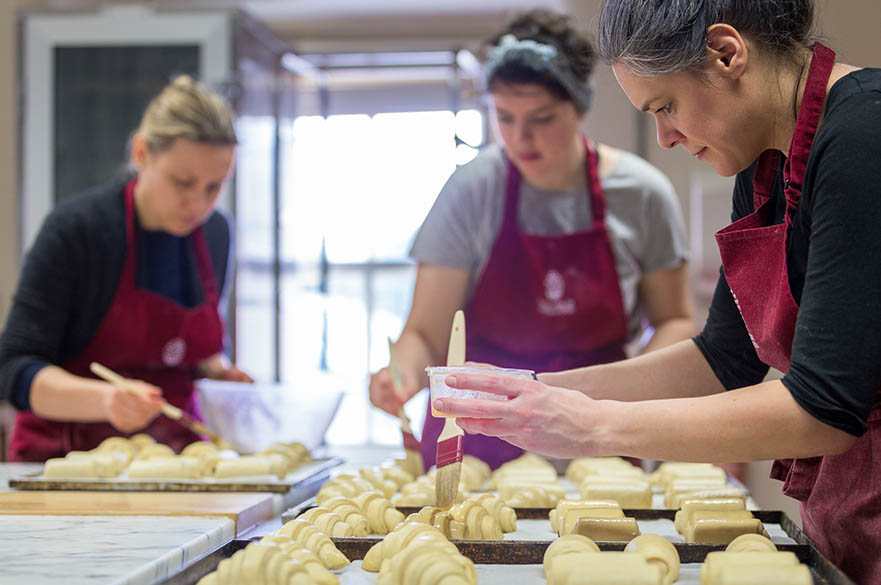This course is in Clearing
Offers from 80 tariff points
About this course
This course will develop your practical skills and techniques in artisan food production, alongside teaching you how to establish sustainable and ethical food practices to improve current food production processes. You will also explore the cultural importance of traditional artisan foods, both within the UK and further afield.
The course is delivered by professional artisan food specialists at The School of Artisan Food – based on the Welbeck Estate, in Nottinghamshire – alongside food technology specialists at Nottingham Trent University, on the Brackenhurst Campus.
Which course is right for you?
We offer two artisan food production degrees, each with a different focus:
- BSc (Hons) Artisan Food Production (this course) - explores the context of artisan food within the wider food industry, with some hands-on practical modules, you will also explore the ethical and sustainability issues in food production.
- FdSc Artisan Food Production - is more vocational, with greater emphasis on practical and applied skills, ideal for those who want to set-up an artisan food business.
5
What you’ll study
During this course, you will learn the skills needed to work in the artisan food industry as well as the wider food production sector. From developing your practical skills, and producing a range of food products, to setting up an artisan food business. You will also study microbiology, nutritional quality, chemistry and the physical and eating qualities of food.
Introduction to Artisan Bread (20 credits)
Through a mixture of theory and practical bread making sessions, develop your understanding of the fermentation process and critical key stages to bread making. You’ll also learn about recipe formulation, and raw bread material function in fermented baking.
Patisserie and Viennoiserie (20 credits)
Gain a knowledge of the ingredients, artisan production methods, baking techniques, and vocabulary associated with artisan patisserie and viennoiserie. This module will also equip you with the necessary technical skills needed to produce a variety of different artisan products.
Artisan Dairy Production (20 credits)
This module will provide a background to the UK dairy industry. You will gain an in-depth knowledge of the production of dairy products, including a range of cheese types and undertake practical sessions to manufacture hard and soft cheeses, cream, butter, yoghurt and ice cream.
Food Chemistry (20 credits)
Understand the key scientific principles relevant to food science, including the constituents of food and the effects these have on both their properties and functions. You’ll also develop the skills necessary to undertake simple laboratory analysis of food and interpret the data.
Artisan Business Entrepreneurship and Marketing (20 credits)
Gain the skills needed to plan an independent artisan business, including an overview of the key choices facing a start-up business, and developing a realistic marketing proposition for an artisan food business. You’ll also explore sustainability, ethical and health issues relating to food production, consumption and quality, and how this relates to producers.
Food Raw Materials (20 credits)
Understand the different attributes of a range of food raw materials and evaluate how agricultural practices affect their quality. The module also covers raw material supply chain management procedures, and how primary production is manipulated to modify characteristics of raw materials.
Consumer Nutrition and Health (20 credits)
Gain an understanding of human nutrition and the ability to analyse foods for macronutrients associated with nutrition and allergies. Throughout this module, you’ll also learn how consumer nutrition needs and trends affect product development, processing and packaging
Artisan Business Operations and Finance (20 credits)
This module will provide you with the tools needed to operate an independent artisan business and understand the associated finance including feasibility, and start-up options.
Artisan Business Planning (20 credits)
Learn how to develop a financially robust business plan for an artisan start-up and pitch to investors. You’ll gain an understanding of return on investment and its application in business planning, and risk management within an artisan food business.
Food Industry Professional Practice (20 credits)
Throughout this module you'll develop a portfolio and professional social media profile. You’ll also be given support with your continuing professional development, and engage with our university employability team to improve your future graduate work prospects.
Sustainable Food Production (20 credits)
Discuss the challenges, problems and benefits related to the sustainability of food production and food supply chains. You'll also identify and evaluate methods by which the environmental impact of the food industry can be minimised.
The Artisan Shop (20 credits)
In this module you'll work on a real-life industry brief and create a concept for a new product in an existing artisan business. You'll take into account the location of the business, the current market, customer demographics, existing product range and develop a proposal that complements the current offering.
This is a placement year for students on the four year course.
Food Biochemistry (20 credits)
Study the biochemical aspects of food processing, both beneficial (e.g. fermentation processes) and detrimental (e.g. food spoilage). Genetically modified (GM) crops and microbes will also be explored.
Product Innovation (20 credits)
Working in a team, you'll address all the stages involved in the development of a new food product, from concept to retail. You'll develop your own understanding of the constraints within which new food product development takes place.
Global Food Systems and Culture (20 credits)
Explore food in terms of its role within society and the cultural practices involved in producing, preparing, consuming and talking about food. You'll examine food cultures from around the world and compare them with those in the UK. You'll also develop an understanding of the international food chain and how artisan producers fit into the global food system.
Artisan Food Industry Management (20 credits)
Develop your management skills and examine management issues of particular relevance to the food industry. You'll also look at the commercial and political environment in which the industry operates and the integrated nature of the supply chain.
Dissertation (40 credits)
Carry out independent research under supervision. Focus on your own area of interest within the food industry.
We regularly review and update our course content based on student and employer feedback, ensuring that all of our courses remain current and relevant. This may result in changes to module content or module availability in future years.
Student Work
Video Gallery
How you're taught
You'll learn via a variety of lectures, seminars, laboratory and practical sessions.
Assessments include assignments, portfolios, team presentations, practical assessments, exams, class tests, essays, project work, case study and a dissertation.
On this course your teaching will be split between The School of Artisan Food, based in north Nottinghamshire on the Welbeck Estate, and Nottingham Trent University Brackenhurst Campus.
Applied practice is integral to this course and you'll be supported to gain relevant industry experience with the opportunity to take a year-long placement.
Please note that field trip locations may vary and are subject to availability and change.
Careers and employability
Your future career
This course will provide you with skills to work in a variety of roles within food manufacturing and retail, including innovation and new product development, food buyer roles, supply chain roles, new product technologist, procurement and food marketing to meet the increasing demand for sustainably produced, high-quality artisanal food. It will also teach you the skills required to set up your own business.
If you feel you need additional support to realise your business proposition, the NTU Enterprise Centre are able to provide additional support to entrepreneurs and new businesses.
Work-like experience projects
You will also benefit from work-like experience opportunities embedded into your course, allowing you to engage directly with industry and develop essential professional skills, knowledge and attributes for future career success. Recently, our Artisan Food Production students completed a work-like project with Dropworks Distillery to create a viable marketing plan for a new or existing artisan product or business.
Campus and facilities
The School of Artisan Food has an outstanding reputation for the quality of training it provides, and you’ll benefit from staff who are some of the most skilled and experienced artisan producers and practitioners in the UK, Europe and beyond.
They also boast newly refurbished, purpose-built training rooms and a demonstration theatre, which all include state-of-the-art specialist equipment.
Meanwhile you’ll also have access to all of the facilities at Nottingham Trent University. As a dedicated home for our animal, rural and environmental science courses, the Brackenhurst Campus has a character all of its own. From the population of almost 2,000 students and staff to the animals themselves — cats and cattle, sheep and horses — it’s all about community. Relax with a coffee in the Orangery; kick back with your coursemates in the Brack Bar; enjoy the peace and quiet of our Victorian walled garden or Eco-Library; grab a pal and wander through 500 acres of stunning countryside.
Our Brackenhurst Campus sits on the doorstep of Southwell: a picture-perfect market town filled with rustic pubs, cosy cafés, and boutique shops. A little further afield, and served by reliable buses that run late into the night, you’ve got Nottingham — one of Britain’s top 10 student cities, and one of Europe’s top 25. It’s stuffed with history, culture, and well-kept secrets to discover at your leisure: enjoy lush green spaces, galleries, hidden cinemas and vintage shopping by day, and an acclaimed food, drink and social scene by night.
Entry requirements
This course is in Clearing
Looking for a place in Clearing? We are accepting application and would love to hear from you!
UK students
This course is in Clearing
Looking for a place in Clearing? We are accepting applications and would love to hear from you!
Clearing requirements
From 80 UCAS tariff points from up to 4 qualifications.
To discuss our entry requirements and see what we can offer you, call us now on +44 (0)115 848 6000. Alternatively, if you already have your qualifications, apply online via our Clearing Application form.
Preparing for results day? Beat the queue and sign up for NTU Priority for up-to-date information about all things Clearing. You’ll get an offer ahead of Clearing, subject to you achieving the required grades on results day.
To find out what qualifications have tariff points, please use our tariff calculator.
Additional requirements for UK students
There are no additional requirements for this course.
Contextual offers
If you don’t quite meet our entry requirements, we might be able to make you a lower offer based on a range of factors, including your background (such as where you live and the school or college you attended), your experiences and your individual circumstances (you may have been in care, for example). This is called a contextual offer, and we get data from UCAS to help make these decisions. We do this because we believe everyone with the potential to succeed at NTU should have the opportunity to do so, no matter what barriers you may face.
Meeting our entry requirements
Hundreds of qualifications in the UK have UCAS Tariff points attached to specific grades, including A-levels, BTECs, T Levels and many more. You can use your grades and points from up to four different qualifications to meet our criteria. Enter your predicted or achieved grades into our Tariff calculator to find out how many points your qualifications are worth.
Other qualifications and experience
NTU welcomes applications from students with non-standard qualifications and learning backgrounds, either for year one entry or for advanced standing beyond the start of a course into year 2 or beyond.
We consider study and/or credit achieved from a similar course at another institution (otherwise known as credit transfer), vocational and professional qualifications, and broader work or life experience.
Our Recognition of Prior Learning and Credit Transfer Policy outlines the process and options available for this route. If you wish to apply via Recognition of Prior Learning, please contact the central Admissions and Enquiries Team who will be able to support you through the process.
Getting in touch
If you need more help or information, get in touch through our enquiry form.
International students
This course is in Clearing
Looking for a place in Clearing? We are accepting applications and would love to hear from you!
Clearing requirements
From 80 UCAS tariff points from up to 4 qualifications.
To discuss our entry requirements and see what we can offer you, call us now on +44 (0)115 848 6000. Alternatively, if you already have your qualifications, apply online via our Clearing Application form.
Preparing for results day? Beat the queue and sign up for NTU Priority for up-to-date information about all things Clearing. You’ll get an offer ahead of Clearing, subject to you achieving the required grades on results day.
Unfortunately, this course is not open to international students
Additional requirements for international students
If you need help achieving the academic entry requirements, we offer a Foundation preparation course for this degree. The course is offered through our partner Nottingham Trent International College (NTIC) based on our City campus.
English language requirements
View our English language requirements for all courses, including alternative English language tests and country qualifications accepted by the University.
If you need help achieving the language requirements, we offer a Pre-Sessional English for Academic Purposes course on our City campus which is an intensive preparation course for academic study at NTU.
Other qualifications and experience
If you have the right level of qualifications, you may be able to start your Bachelors degree at NTU in year 2 or year 3. This is called ‘advanced standing’ entry and is decided on a case-by case basis after our assessment of your qualifications and experience.
You can view our Recognition of Prior Learning and Credit Transfer Policy which outlines the process and options available, such as recognising experiential learning and credit transfer.
Sign up for emails
Sign up to receive regular emails from the International Office. You'll hear about our news, scholarships and any upcoming events in your country with our expert regional teams.
Getting in touch
If you need advice about studying at NTU as an international student or how to apply, our international webpages are a great place to start. If you have any questions about your study options, your international qualifications, experience, grades or other results, please get in touch through our enquiry form. Our international teams are highly experienced in answering queries from students all over the world.
Policies
We strive to make our admissions procedures as fair and clear as possible. To find out more about how we make offers, visit our admissions policies page.
